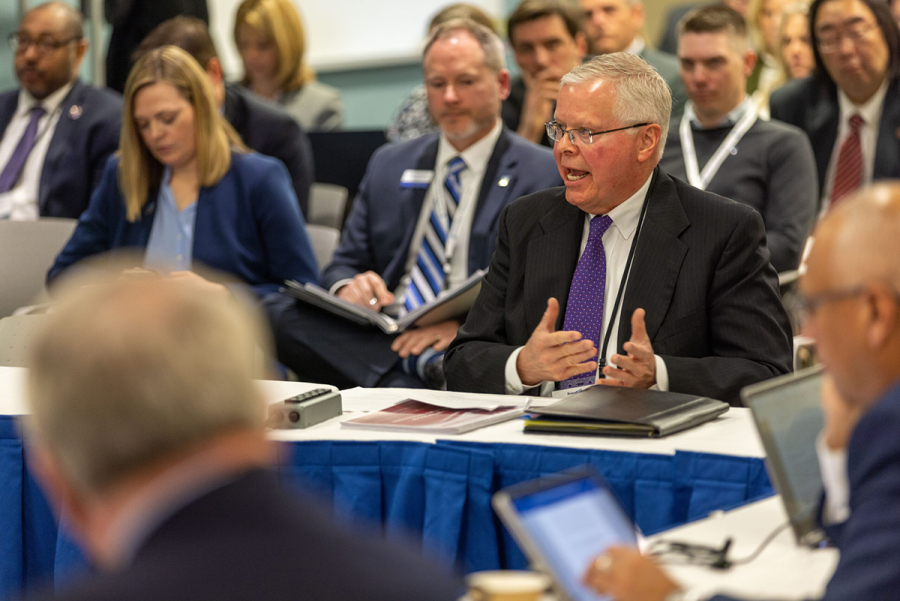UW System ends 10-year tuition freeze
Board of Regents approves 4.5% increase in resident undergraduate tuition
Photo by UW System
UW System President Jay Rothman at the Board of Regents meeting.
The UW System approved an average 4.5% increase for 2023-24 resident undergraduate tuition rates at the Board of Regents meeting on Thursday, March 30, ending a 10-year tuition freeze for resident undergraduate students.
The system-wide 4.5% increase in resident undergraduate tuition means a $372 increase at UW-Madison, a $364 increase at UW-Milwaukee, a $283 increase at the comprehensive campuses and a $214 increase at the branch campuses for the 2023-24 fiscal year, according to the UW System.
UW-Eau Claire will have a $283 increase and UW-Eau Claire — Barron County will have a $214 increase in resident undergraduate tuition.
The UW System also approved increases to non-resident tuition, segregated fees, room rates and meal plans for 2023-24. More information about these changes is available in the 2023-24 Tuition and Auxiliary Rates document.
The UW System anticipates the current decrease in enrollment to continue and lead to a decline in the General Purpose Revenue (GPR)/tuition and auxiliary fund balances.
Inflation and the return to pre-pandemic spending levels will also put pressure on the fund balances, according to the UW System.
“The UW System’s 10-year freeze on resident undergraduate tuition is not sustainable, as costs have increased, and inflation has accelerated,” the 2023-24 Tuition and Auxiliary Rates document says.
Chancellor James Schmidt said during the 10-year resident undergraduate tuition freeze, there have been cuts in state appropriations and the amount UW-Eau Claire receives for campus operations has only recently increased beyond what it was in 2013.
“That’s created a real hardship for the campus. We’ve been through massive cuts during that period of time and frankly, it was just not a sustainable piece to keep those freezes in place,” Schmidt said. “Ideally the state would pick up more of that, but without that, it’s important that we have the resources necessary so that we can protect the quality of education that a UW-Eau Claire degree has stood for.”
Schmidt said this tuition increase will partially help pay for faculty pay increases and the expansion of the nursing program.
“It’s important that we pay our faculty and staff a reasonable amount in order to attract and retain them,” Schmidt said. “Wisconsin has been lagging behind in our salaries for faculty and staff even before I got here.”
Schmidt said the university is working to expand the nursing program and allow more students into the program to address the nursing shortage.
The Chancellor’s Office sent an email on Monday, April 10 to all students enrolled for fall 2023 to notify them of the recently approved tuition increases.
“We remain committed to ensuring tuition is affordable and continuing to provide Blugolds a transformative educational experience that is second to none. I am proud to say UW-Eau Claire ranks as one of the most affordable universities in the Midwest and beyond,” Schmidt said in the email.
Student Body President Rossellin Gaitán, a fourth-year English student with a critical studies in literatures, cultures and film emphasis, said increased financial burdens, such as the tuition increase, cause stress for students.
“It’s one of those things where I understand that something had to give and was due to happen,” Gaitán said. “The burden of financial complications is still there, so this might stress someone out more.”
Gaitán said UW-Eau Claire helps students experiencing financial difficulties through programs like the Blugold Emergency Fund, the Campus Harvest Food Pantry and Campus Closet.
Student Body Vice President Brett Farmer, a third-year integrated strategic communications student with a public relations emphasis, said the tuition increase was inevitable without more federal assistance.
“From an institutional standpoint it makes a lot of sense because we’ve had the tuition freeze for so long now,” Farmer said. “Look at inflation that has happened since the tuition freeze started and it’s kind of crazy that we haven’t had to do this (already).”
Farmer said the tuition increase could have been much higher and the Regents were cognizant of students’ financial situations by only approving a 4.5% increase.
Kasper can be reached at kasperml9306@uwec.edu.

Maddie Kasper is a fourth-year journalism and political science student and this is her seventh semester at The Spectator. She covered the UW-Eau Claire Student Senate for three consecutive semesters and dreams of being a national political correspondent, but also loves sports photography. She adores poems about oranges, obsessively logging movies on Letterboxd and the Half Price Books on the east...

